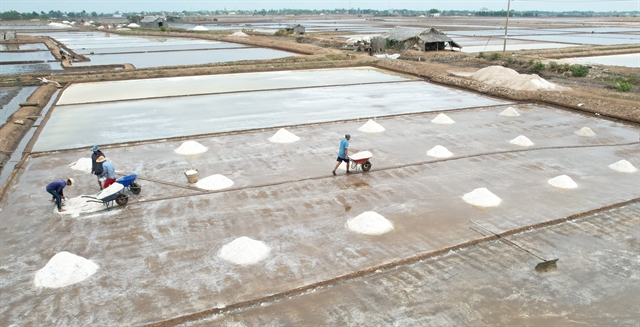 Sunday/Weekend
Sunday/Weekend

 |
| Salt fields in Bạc Liêu Province’s Đông Hải District. The province is taking measures to preserve the century-old salt- making occupation.– VNA/VNS Photo |
BẠC LIÊU – Salt farmers in Bạc Liêu Province earned big profits in the 2023-24 season because of high yields.
The Cửu Long (Mekong) Delta province, one of the country’s largest salt producing provinces, normally starts production in December and finishes in April.
It has nearly 1,400ha of salt fields, with Đông Hải District alone accounting for nearly 1,300ha.
In the district’s Long Điền Đông Commune, farmers now sell salt at VNĐ800-1,000 a kilogramme, down VNĐ200 – 400 since the beginning of the season.
But they still have big profits because of high yields.
Strong sunshine and winds are favourable conditions for salt water to crystallise quickly, according to farmers.
Hồ Văn Năm, who has a one-hectare salt field in Long Điền Đông, said the season began early because of the early end to rains and strong sunshine.
His family had harvested 70 per cent of the expected volume for the season so far, he said.
Farmers hoped prices would remain steady at current prices so that they could feel secure, he said.
Hồ Minh Chiến, chairman of the Đông Hải High-Tech Salt Making Co-operative, said besides the favourable weather, farmers were also getting higher yields because they use advanced techniques and machinery, especially for harvesting and transporting salt.
Châu Mộng Đỉnh, a member of the co-operative, uses machines for harvesting and only needs to hire three workers for his 16ha, while manual harvesting needs 10.
With the use of machines, he saves VNĐ300 million (US$12,200) on wages each season.
To use machines, farmers have to use modern production methods that use plastic sheets to cover field beds to produce clean salt, which requires an investment of VNĐ700 million ($28,400) per hectare.
The plastic sheet method produces cleaner salt with high yields, which in turn fetches higher prices than salt made using traditional methods.
But it is not done on a large scale because of the high investment required.
Hồ Thanh Tuấn, head of the Đông Hải Bureau of Agriculture and Rural Development, said it was only used on 7 per cent of the 1,300ha.
The district administration had called on banks to provide loans to farmers and encouraged the latter to join co-operatives and co-operative groups to expand production, he said.
Salt-making has been a livelihood in Bạc Liêu for more than 100 years and recognised as a national intangible cultural heritage.
It also has geographical indication status from the National Office of Intellectual Property, known nation-wide for its taste and is exported to many countries, including Japan and South Korea.
Yet, salt farmers have not become wealthy because of a number of difficulties.
According to Lưu Hoàng Ly, director of the province Department of Agriculture and Rural Development, these include the impact of climate change, which increasingly brings unseasonable rains and pollution of seawater.
The use of technology by farmers is limited and many lack information about and money to invest in new techniques.
Preservation
To preserve and improve the occupation, the Ministry of Agriculture and Rural Development has granted the province VNĐ130 billion ($5.3 million) to upgrade salt fields.
The investment will go into infrastructure such as electricity, roads and irrigation, and help farmers improve quality and production efficiency.
The province is soliciting investment to build brands for food and medical salts.
According to Phạm Văn Thiều, chairman of the province People’s Committee, despite all the difficulties, farmers are determined to sustain salt production.
Shrimp, rice and salt are key products in the province’s agricultural development plans.
“Besides investing in and upgrading infrastructure for making salt, the province will also seek outlets and build the Bạc Liêu salt brand at home and abroad.”
The province had approved a project to enhance salt production and processing in 2021-23 to ensure land area is 1,500ha and annual output is 66,000 tonnes by 2030.
It will focus on exploiting and developing the Bạc Liêu salt brand, combining production with tourism services.
It has two salt processing companies with a total capacity of 36,000 tonnes a year and they export their products to Japan and South Korea.
It has 10 products made from salt that have been recognised under the country’s “One Commune-One Product” programme.
In the 2022-23 season it produced salt on 1,419ha.– VNS




